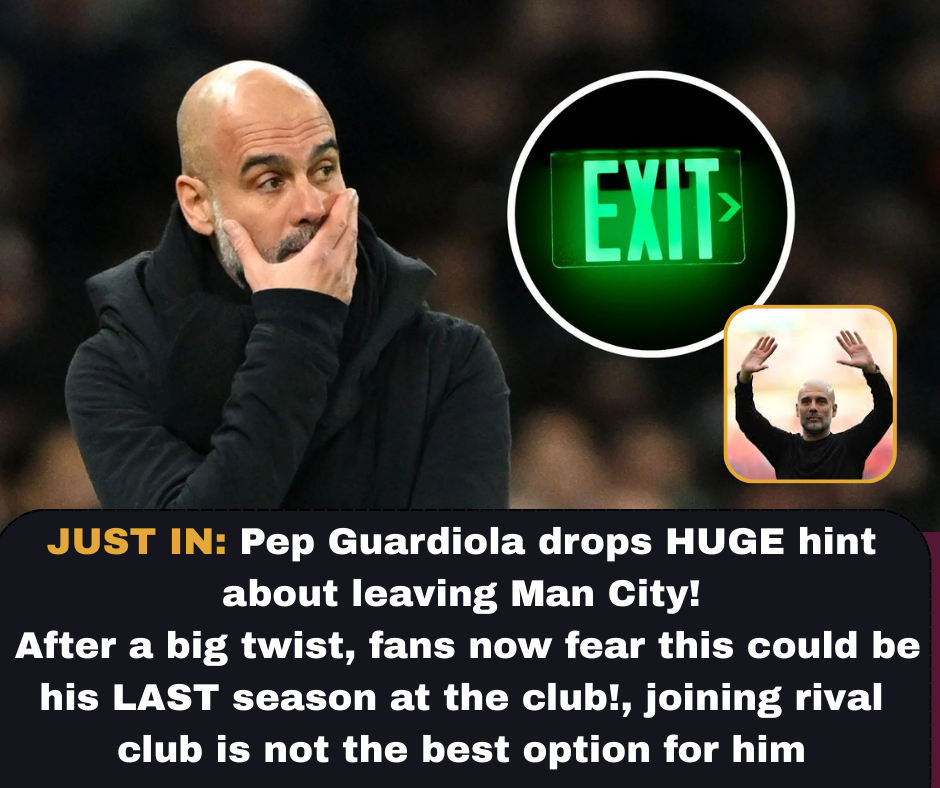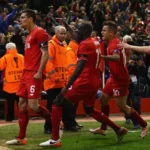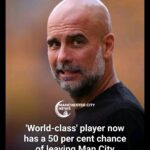Pep Guardiola Drops Major Hint About His Manchester City Future Amid Exit Speculation

he football world remains captivated by the uncertainty surrounding Pep Guardiola’s future at Manchester City as the Catalan manager approaches the final months of his contract. The mastermind behind City’s unprecedented era of dominance recently offered intriguing insights into his plans during a pre-match press conference ahead of their crucial Champions League fixture against Sporting Lisbon. His comments regarding incoming Director of Football Hugo Viana have sparked renewed speculation about whether the most successful manager in the club’s history might extend his illustrious tenure beyond this season.
Guardiola’s impending decision represents one of the most consequential moments in Manchester City’s modern history. Since his arrival in 2016, the Spanish tactician has transformed the club into not only the dominant force in English football but also elevated them to the pinnacle of the European game. As reigning Premier League champions and having finally secured the elusive Champions League trophy that had long evaded them, City finds itself at a pivotal juncture where continuity in leadership could prove decisive in maintaining their position at football’s summit.
“I’m looking forward to speaking with him this season,” Guardiola stated when asked about potential discussions with Viana, who is set to succeed the departing Txiki Begiristain. “But I think he’s in touch with Ferran Soriano, with Txiki [Begiristain] a lot, and hopefully maybe in the next month or weeks we’ll be in touch.”
This seemingly innocuous statement has been interpreted by many as a subtle indication that Guardiola envisions himself having a working relationship with the incoming director beyond the current campaign—a prospect that would necessitate extending his contract. While careful not to make any definitive commitments, the manager’s willingness to engage in forward-planning discussions has given City supporters renewed hope that the Guardiola era might continue.
The Guardiola Effect: Nine Years of Revolutionary Success
To fully appreciate the significance of Guardiola’s potential departure or extension, one must understand the transformative impact he has had on Manchester City and English football more broadly. When he arrived in Manchester in the summer of 2016, Guardiola brought with him a reputation as football’s preeminent tactical innovator, having revolutionized the game during his tenures at Barcelona and Bayern Munich.
After a transitional first season, Guardiola’s vision began to materialize in spectacular fashion. The 2017-18 campaign saw City rewrite the Premier League record books, amassing an unprecedented 100 points while playing a brand of football that combined positional mastery, technical brilliance, and relentless intensity. This “Centurion” season marked the beginning of a period of domestic dominance unmatched in the modern era.
Under Guardiola’s stewardship, Manchester City has claimed six Premier League titles in seven seasons, including an extraordinary four consecutive championships—a feat never before achieved in the English top flight. This domestic supremacy has been complemented by multiple FA Cup and League Cup triumphs, along with their watershed Champions League victory that completed a historic treble and silenced those who questioned whether Guardiola’s philosophy could succeed on the European stage.
Beyond the remarkable trophy haul, Guardiola’s legacy at City will be defined by the distinctive playing style he has implemented. His teams have redefined positional play in England, with their meticulous build-up, intricate combination play, and strategic pressing fundamentally altering conceptions of how the game can be played. This tactical imprint has influenced coaches throughout the football pyramid and challenged rival clubs to evolve their own approaches.
Equally significant has been Guardiola’s player development, with numerous squad members experiencing remarkable growth under his guidance. Players like Kevin De Bruyne, Raheem Sterling, Bernardo Silva, and Phil Foden have reached new heights under his tutelage, while others like João Cancelo, Rodri, and Erling Haaland have been seamlessly integrated into his sophisticated system despite arriving with playing styles that required adaptation.
The Timing Dilemma: Why Guardiola’s Decision Carries Immense Weight
The timing of Guardiola’s contract situation presents both challenges and opportunities for Manchester City. His current deal expires at the conclusion of the 2024-25 season, placing the club in a delicate position as they navigate their immediate competitive priorities while simultaneously preparing for potentially significant organizational change.
From a succession planning perspective, City has been proactive in restructuring their technical leadership. The appointment of Hugo Viana represents a forward-thinking move, bringing in a highly regarded football executive who earned plaudits for his work at Sporting Lisbon. Nevertheless, the transition from Begiristain to Viana would undoubtedly be smoothed by Guardiola’s continued presence, allowing for gradual evolution rather than simultaneous change in multiple key positions.
The squad dynamics also factor heavily into the equation. Manchester City possesses a core of veteran players whose futures may be influenced by Guardiola’s decision. Kevin De Bruyne, Bernardo Silva, and Kyle Walker are among the established stars whose contracts will need addressing in the coming year. The certainty of Guardiola’s situation could prove instrumental in securing continued commitment from these cornerstones of City’s success.
Conversely, City has also invested substantially in developing the next generation, with talents like Phil Foden, Rico Lewis, and Oscar Bobb representing the club’s future. Guardiola has demonstrated exceptional skill in managing this delicate balance between experience and youth, gradually integrating emerging players while maintaining elite performance levels. Any successor would face the considerable challenge of continuing this developmental pathway while sustaining City’s competitive standards.
Then there’s the psychological dimension. Guardiola’s aura and tactical acumen provide City with an intangible advantage before matches even begin. Opponents approach games against Guardiola’s teams with heightened caution, often altering their own approaches in deference to City’s capabilities. This psychological edge, built over nine years of consistent excellence, represents an asset that would dissipate overnight should Guardiola depart.
The Hugo Viana Factor: A New Partnership in the Making?
Guardiola’s comments regarding Hugo Viana merit particular attention, as they potentially offer the clearest insight into his thinking. The Portuguese executive has been appointed to replace Txiki Begiristain, who has worked alongside Guardiola since their shared days at Barcelona and has been instrumental in constructing the squad that has achieved such remarkable success.
Begiristain’s departure could conceivably have pushed Guardiola toward the exit, given their long-standing professional relationship and aligned football philosophy. However, Guardiola’s expressed eagerness to establish a working relationship with Viana suggests he sees potential in this new partnership, perhaps even viewing it as an opportunity to refresh City’s recruitment approach and tactical evolution.
“I’m looking forward to speaking with him this season,” Guardiola said, a statement that carries more significance than might initially appear. The mention of “this season” indicates near-term planning, while the suggestion that they would discuss future strategies implies Guardiola envisions himself having input beyond his current contractual arrangement.
Viana arrives with an impressive pedigree, having overseen Sporting Lisbon’s resurgence as a Portuguese football powerhouse. During his tenure as Sporting’s Director of Football, the club ended a 19-year league title drought and established a reputation for sophisticated talent identification and development. His expertise in identifying promising young players and creating pathway systems for their integration into the first team aligns perfectly with City’s long-term vision.
Should Guardiola commit to extending his stay, the partnership with Viana could potentially herald a new phase in City’s project. While the club has consistently recruited established stars during Guardiola’s tenure, a collaboration with Viana might shift the focus more definitively toward identifying emerging talent capable of sustaining success for the next generation. This evolution would represent a natural progression for a club that has achieved all immediate sporting objectives and now seeks to ensure longevity of their dominance.
The Personal Equation: Guardiola’s Motivations and Considerations
Understanding Guardiola’s decision-making process requires acknowledging the complex personal factors that influence his career choices. Throughout his managerial career, Guardiola has been candid about the mental and emotional demands of elite coaching, frequently referencing the intense pressure and risk of burnout that accompany the position.
His managerial history reveals a pattern of relatively concise tenures. At Barcelona, despite unprecedented success, Guardiola departed after four seasons, citing exhaustion and the need for new challenges. His Bayern Munich spell lasted three years before he sought the Premier League opportunity. In this context, his nine years at Manchester City represent a remarkable deviation from precedent, suggesting he has found unique fulfillment in his current role.
Family considerations invariably influence such significant professional decisions. Guardiola’s wife and children have established roots in Manchester, with his daughter developing her own professional career in the region. These personal attachments cannot be discounted when evaluating the likelihood of Guardiola extending his City tenure or seeking a new challenge elsewhere.
Then there’s the question of legacy. Guardiola has already secured his place in football history, having revolutionized the game at multiple clubs and accumulated a trophy collection that places him among the greatest managers of all time. Yet the opportunity to build a truly dynastic project—something that spans over a decade at one club—might appeal to his sense of historical contribution. Sir Alex Ferguson’s 26-year reign at Manchester United established a benchmark for managerial longevity in the modern era; while matching that tenure seems implausible, Guardiola might be intrigued by the prospect of creating a comparable multi-generational legacy.
National team management represents another potential next step in Guardiola’s career trajectory. He has occasionally expressed interest in international football, with numerous national associations undoubtedly prepared to offer him unprecedented terms should he indicate availability. The reduced day-to-day intensity of international management, combined with the different tactical challenges it presents, could prove an attractive proposition for a coach who has accomplished everything at club level.
The Broader Context: A Changing Premier League Landscape
Guardiola’s decision will unfold against the backdrop of significant evolution within the Premier League competitive environment. The emergence of Arsenal as legitimate title challengers under his former assistant Mikel Arteta has introduced a compelling new rivalry, while Liverpool’s appointment of Arne Slot to succeed Jürgen Klopp signals their intent to remain among the elite. Manchester United continues its rebuilding process, Chelsea has invested heavily in young talent, and Newcastle’s Saudi-backed project threatens to disrupt the established hierarchy.
This intensifying competition might influence Guardiola in conflicting ways. On one hand, the growing challenge could provide fresh motivation to extend his City tenure, offering the stimulation of adapting to overcome new threats. Conversely, having achieved unprecedented dominance, Guardiola might question whether further Premier League success would significantly enhance his legacy, potentially making this natural transition point more appealing.
The club’s financial context also merits consideration. Manchester City continues to navigate the implications of the Premier League’s 115 charges relating to alleged financial rule breaches, a complex legal process that remains ongoing. While Guardiola has consistently expressed confidence in the club’s position, the uncertain outcome represents an additional variable in his deliberations about long-term commitment.
The Succession Question: Who Could Follow Guardiola?
Should Guardiola ultimately decide to depart, Manchester City would face the daunting challenge of identifying a successor capable of maintaining their extraordinary standards. The club’s hierarchy has presumably engaged in preliminary contingency planning, with several potential candidates likely under consideration.
Internal promotion represents one logical path. Enzo Maresca, who previously served on City’s coaching staff before departing for managerial opportunities elsewhere, has demonstrated an understanding of Guardiola’s principles while developing his own coaching identity. His familiarity with the club’s culture and systems could facilitate a smooth transition while preserving philosophical continuity.
Among external candidates, several prominent coaches have been speculatively linked with the position. Julian Nagelsmann has earned recognition for his progressive tactical approach and experience managing elite talent at Bayern Munich. Roberto De Zerbi garnered attention for implementing an ambitious possession-based system at Brighton that shares conceptual similarities with Guardiola’s approach. Luis Enrique, currently leading PSG, has both the high-level experience and the Barcelona connection that might appeal to City’s leadership.
Yet the reality remains that any successor would face the unenviable task of following a generational coaching talent who has redefined expectations at the club. The example of Manchester United’s post-Ferguson struggles serves as a cautionary tale about the challenges of succession planning, even for the most sophisticated organizations.
The Path Forward: Reading Between the Lines
While Guardiola maintained his characteristic discretion during the press conference, several elements of his commentary offer potential insights into his thinking. His explicit mention of establishing communication with Viana “in the next month or weeks” suggests he sees imminent value in beginning their working relationship, rather than delegating this entirely to existing leadership.
Similarly telling was Guardiola’s body language and demeanor when discussing the club’s future. Observers noted his engaged expression and animated gestures when addressing questions about City’s long-term planning—behavior consistent with someone who maintains personal investment in outcomes that extend beyond his current contract.
The timing of any announcement remains uncertain. Historically, Guardiola has preferred to resolve contract situations without mid-season distraction, often making decisions during breaks in the competitive calendar. With City currently navigating crucial fixtures across multiple competitions, any definitive statement might be delayed until a natural intermission arises.
What appears increasingly evident is that Guardiola retains genuine affection for Manchester City as an institution. Throughout his tenure, he has consistently praised the club’s organizational culture, supportive ownership, and alignment between technical staff and executives. These factors have created an environment where Guardiola has enjoyed both unprecedented resources and the autonomy to implement his vision—conditions that would be difficult to replicate elsewhere.
Conclusion: The Decision That Will Shape Football’s Future
As Manchester City progresses through this pivotal season, the football world watches with intense curiosity to see whether Guardiola will extend his remarkable tenure or conclude what already ranks among the most successful managerial reigns in football history.
His recent comments regarding future collaboration with Hugo Viana have provided the first substantive hints that continuation remains a genuine possibility. While falling short of any definitive commitment, Guardiola’s expressed willingness to engage in strategic discussions extending beyond his current contract suggests he hasn’t mentally closed the door on extending his City project.
The stakes could hardly be higher, both for Manchester City and for the broader football landscape. Under Guardiola’s guidance, City has established new benchmarks for excellence and innovation in English football, fundamentally altering perceptions of what’s tactically possible in the Premier League context. His decision will not only determine City’s immediate competitive trajectory but potentially reshape power dynamics throughout European football.
For City supporters, the prospect of Guardiola extending his transformative tenure represents the most desirable outcome imaginable. Having witnessed their club ascend to unprecedented heights under his stewardship, the possibility of continued evolution under football’s preeminent tactician offers tantalizing potential. Yet even if Guardiola ultimately decides that this season represents the natural conclusion to his Manchester City chapter, his legacy as the architect of the club’s golden era remains secure.
As one journalist aptly summarized following the press conference: “Guardiola speaks about Manchester City’s future as though he intends to be part of it. Whether that proves accurate or simply reflects his professional commitment to the present remains to be seen, but City fans will cling to every word as they hope for a continuation of football’s most successful contemporary partnership.”
The coming months will provide definitive answers to these questions. Until then, both Manchester City and their visionary manager remain focused on adding further chapters to their extraordinary shared story, while football observers everywhere await the decision that could reconfigure the sport’s competitive landscape for years to come.















